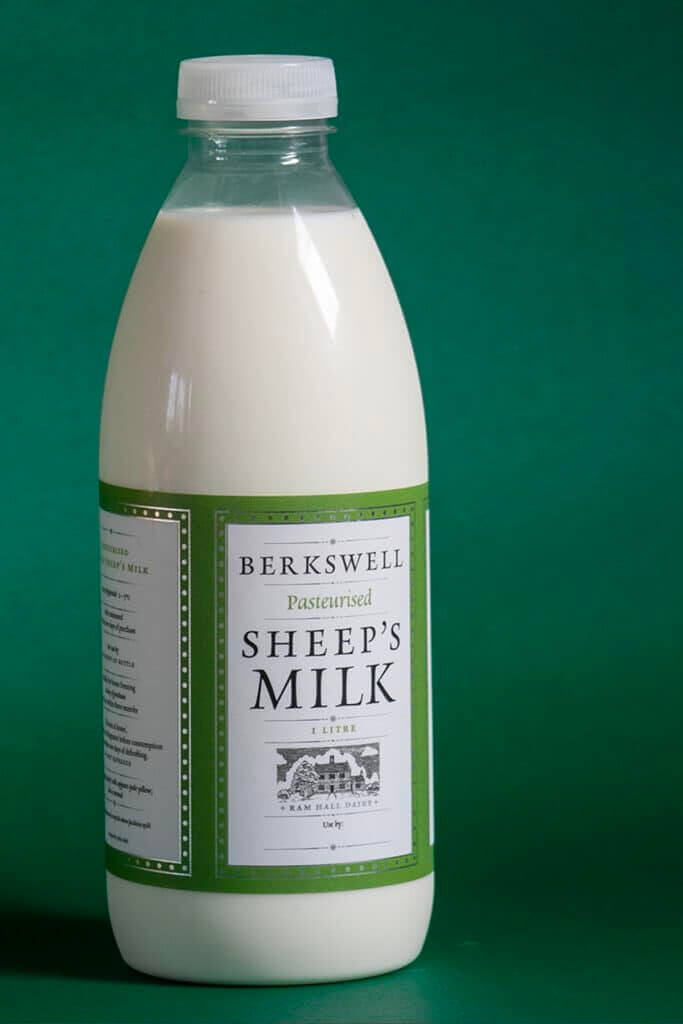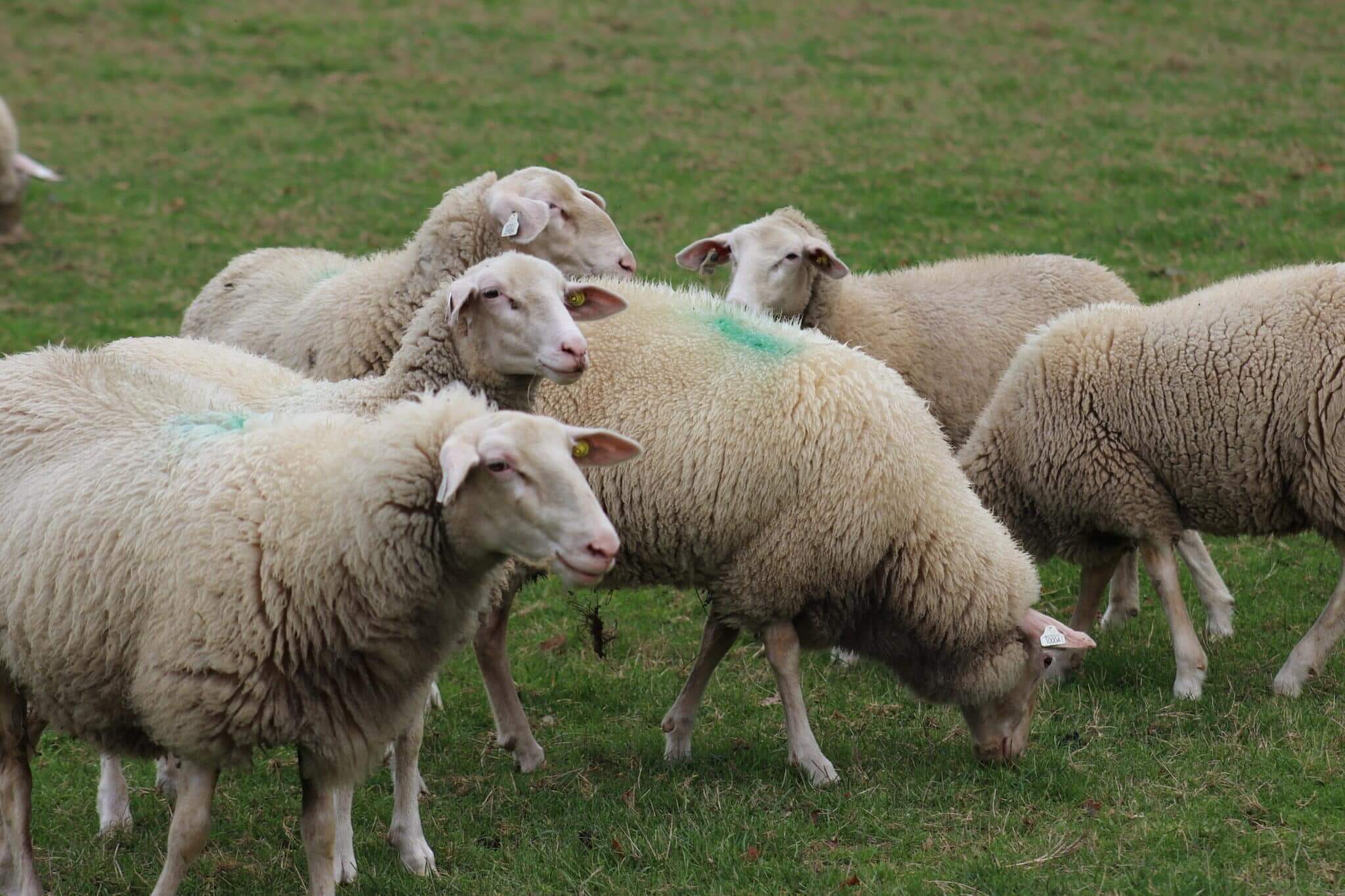These days you can’t move for a new milk. Where once it was simply from a cow (less frequently in this country, another animal), plant-based alternatives crept in towards the end of the 20th century. First soy and rice, oat and almond; more recently hemp, cashew, coconut, even potato. As we began to eschew animal products for environmental, welfare or health reasons, the oat milk flat white took over.
Now one farmer wants to popularise a different alternative, not from plants but animals. Sheep’s milk is widely consumed globally but in Britain, despite having an estimated 30 million sheep, it forms a miniscule percentage of the market. The majority of Britain’s sheep are reared for meat, with just a few farms producing cheese and even fewer selling milk.
Yet Stephen Fletcher, who runs Ram Hall Dairy on the Berkswell Estate, halfway between Coventry and Birmingham, believes his protein-rich, nutrient-dense sheep’s milk, launched in February, will have mass appeal.
According to a report commissioned by Ram Hall by nutritionists Dr Lucy Williamson and Georgina Rees, sheep’s milk is richer in calcium than other milks, the calcium is more easily absorbed by our bodies, and it contains more zinc, vitamin B12 and vitamin A. Its proteins may be more easily digestible for those with intolerances, though more research is needed.
With none of the goat-y tang that puts many off goat milk, a longstanding alternative in this country, could sheep’s milk be about to take off?
If Berkswell rings a bell that’s because it’s the name of one of Britain’s best cheeses, produced on the farm since 1989. Berkswell is a hard cheese with a beautiful, pale butter colour and a sharp umami flavour somewhat reminiscent of Manchego, the classic Spanish sheep’s milk cheese.
It is used by top chefs looking for a homegrown alternative to parmesan, notably in the Berkswell truffle pudding at L’Enclume in Cumbria, which has a weekly delivery, and at Purnell’s in Birmingham. Rick Stein is a fan, and the cheese earned a coveted Super Gold at the 2013 World Cheese Awards.
The Fletchers have been tenant farmers at Ram Hall since 1881, when Stephen’s great-great-grandfather, Thomas Fletcher, arrived from a neighbouring farm and set up a herd of dairy cows. Cattle was king until Stephen introduced 35 ewes in 1989.

Ironically, the initial focus was milk. “The writing was on the wall for small dairy farms back in those days, so we looked at a form of diversification,” says Fletcher, the fifth generation to farm the land (son George, 25, is continuing the legacy). “I enjoy dairying and love milk as a commodity. It’s not an easy way to farm, but it’s rewarding.”
By the mid-1990s, cheese became the sole focus, a reaction to consumer demand and the rising profitability of cheese. Now the family farms 800 sheep in a regenerative system. The ewes graze on diverse pastures including perennial grass leys (pastures) and newly established herbal leys including a mix of grasses, herbs and legumes, many of which store carbon and nitrogen. Regenerative farming is a mixture of principles, and Fletcher is clear it’s a new way of doing things.
“For us, in these early stages, regenerative agriculture has to fit in and enhance our business. It won’t be able to take over until we are sure it’s viable year after year. Our experiences are mixed and although not put off, we realise that it has to be adapted to work.
“My great, great grandfather was an organic farmer by default, my grandfather and father’s generation responded to the Dig For Victory campaign and embraced all that resulted from an exciting time of post war research and development in agriculture. I am of the era who learned from my father’s generation but are being held to account by [my son] George and his contemporaries for the negative side effects of ensuring we never again run the risk of starvation.”
So why is sheep’s milk back on the agenda? Around five years ago, Fletcher began receiving more and more emails from people asking if he sold it. “It was a range of people, from cow’s milk-related allergies to those who wanted to consume a different milk but didn’t want to go down the plant milk route. There were people from different ethnic communities, such as Turks, Greeks, Cypriots and Eastern Europeans, who have a long tradition of making cheese from sheep’s milk at home,” he explains.

The rising demand coincided with a brutally tough few years for Britain’s artisan cheese industry. “It started off with Brexit, then we had the pandemic – 2020 was hopeless,” says Fletcher, as hospitality sales dwindled. Continued lockdowns and an extremely hot summer in 2022 didn’t help.
Then there’s HS2, the controversial, over-due and hugely over budget railway line which Fletcher says is “ploughing its way” through the farm. Forty years ago, the family bought 25 acres of land but compulsory purchases have left them with just five (they farm 320 acres in total, mostly as tenants). “We have also lost some adjoining tenanted land,” says Fletcher. “We eventually got paid for it but have to pay tax on the income, even though we didn’t want to sell in the first place. The loss of land is really starting to inhibit how we run the farm.”
The milk is being sold online and local wholesalers and retailers are trialling it. Cereal Bakery in Bath has been experimenting with it for coffee, saying it steams and pours brilliantly.
“Most of the conversation around alternative milks is always plant-based so it’s exciting to think about other options that are nutrient dense and produced with as little interference as possible,” says co-founder of Cereal, Wing Mon Cheung. “Quite a few of our customers have it in their heads that it is similar to goat’s milk. Those who did try the sheep’s milk enjoyed it and some of them were surprised by its mild flavour.”
Back at Ram Hall, Fletcher hopes sheep’s milk will bring renewed stability to the farm. “The last few years have made us realise we’ve got to be more robust to changes in market conditions.
“Milking the sheep and making the cheese was seen as a diversification from mainstream agriculture, and now we have to diversify within that to open up other opportunities.”












Brilliant news and really hope that sheep milk sales take off. Speaking as one who has dairy intolerance, but can eat some sheep cheese, it is great to hear that there may be sheep milk to have in my drinks and on cereals. I use plant based milks but really do not like all the additives and oils used . Love the idea that the sheep milk has all the natural nutritious values and as I can tolerate some of the cheese I hope I will be the same with the milk. Can’t wait to be able to order some from somewhere.
Hi
Thank you for your comment.
You can buy our milk from our website.
http://www.ramhalldairy.com
Best regards
Stephen
I’m tired of this talk of “regenerative farming” in respect of animal agriculture, because it’s blatant nonsense. Riverford should know better than to keep promoting it and adding George Monbiot’s name in such an article is disingenuous in the extreme, because he has clearly pointed out the lies that are behind the claims of so-called regenerative animal agriculture!
No mention of the lambs that are presumably slaughtered to keep this enterprise running, just as there is never any mention of the calves killed by dairy after impregnating these poor animals every year just to steal their babies from them until they are worn out.
NO animal agriculture is sustainable and with the possible exception of cheese and kefir, no animal products are healthy for humans, regardless of lactose intolerence; and no animal agriculture is without cruelty and killing- these are incontrovertible facts.The exploitation of innocent sentient animals for profit is an abomination and yet here you are celebrating it as a supposedly wonderful thing yet again.
And the comment by someone mentioning their lactose intolerance and talking about “additives and oil” in plant based milks seems like a plant themselves, because Riverford sells plant milks- are these supposed to be unhealthy and unnatural because one has a little sunflower oil in it? The vast majority of the most popular plant milks in this country don’t have oil or any additives, unless vitamins and calcium are considered “additives”. The ubiquitous additives in dairy are blood and puss cells- literally always present and legally allowed. Yum! And consuming the baby milk of any other species is hardly natural in any case.
I fully understand that most people will be annoyed at my words and incapable of empathising with my points or with the poor exploited animals, but we are facing mass extinctions including our own unless people start accepting the fact that animal agriculture is inherently unsustainable, undesirable and unacceptable from a genuine ethical and moral point of view. I’ve heard all of the arguments a hundred times over and I’ve been vegan for almost a decade because I’ve looked into all of the evidence and I’m 100% sure that it’s the only environmental and ethical stance which can be supported by the facts. Please do better, because at this stage, it’s just propaganda.
Andy, I couldn’t agree with you more. Sadly there is no way to produce animal milk that doesn’t involve exploitation and cruelty, however humane the system purports to be. These animals produce milk for their own young and in order for us to steal it for human consumption, the mothers have to be repeatedly impregnated and their babies removed shortly after birth. Breaking this precious bond causes distress each time it happens and when the animal gets to an age where her milk production begins to fall off, there is no reason to keep her alive any longer.
We are complicit in the cruelty if we drink the milk of other species, which is neither natural or necessary for us. PLEASE Riverford, stop classing dairy products as ‘Essential’. They aren’t!!!